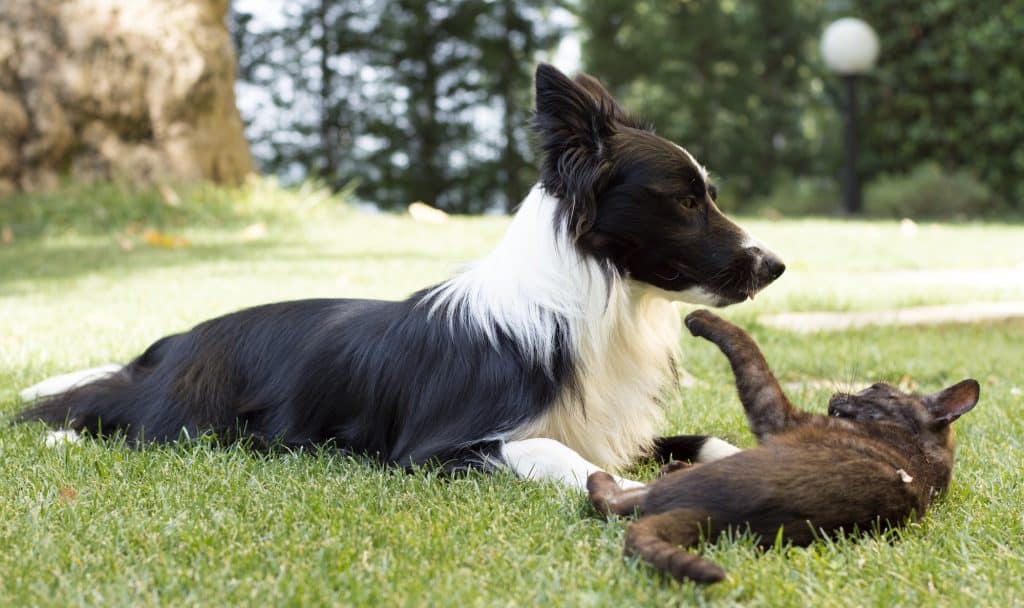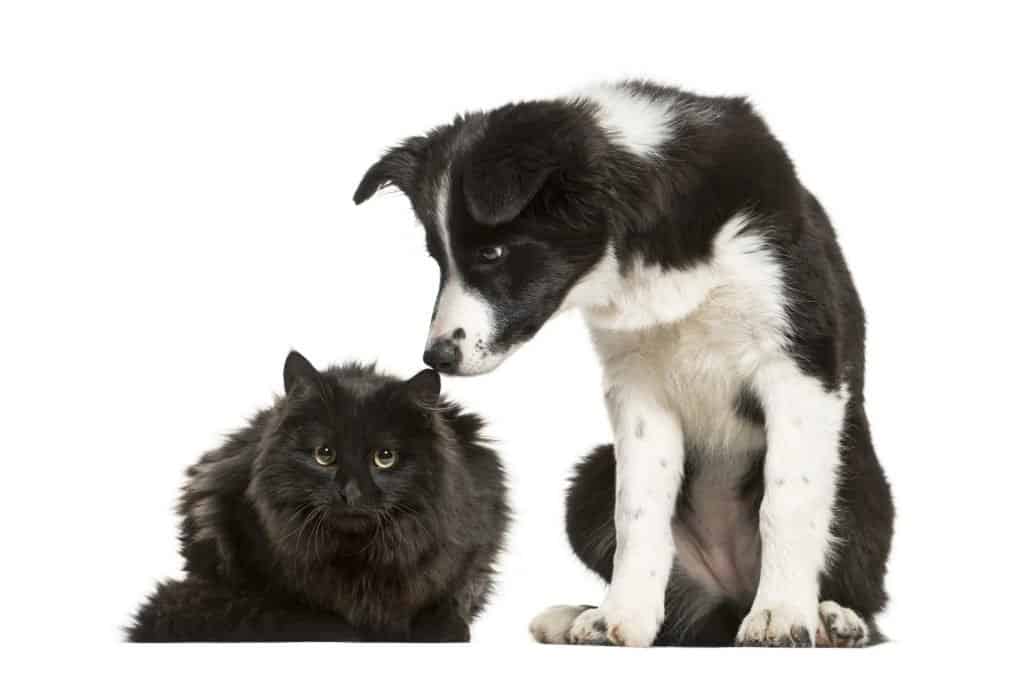We all know the saying “to fight like cats and dogs”. Because of how dogs and cats are depicted in media, people often wonder whether dogs and cats can live harmoniously. What about Border Collies? Are Border Collies good with cats?
This article will discuss whether Border Collies get along with cats, how you can tell if your Border Collie will like cats, as well as things you can do to help nurture their relationship.
Are Border Collies Good With Cats?
Although Border Collies can be good with cats, not all Border Collies will get along with cats. The ability for a Border Collie and cat to live peacefully together is mainly dependent on the characteristics of the individual Border Collie, the cat, the owners, and household dynamics.
No, animal behaviorist, vet, or dog trainer can give you a straightforward yes or no on whether all border collies are good with all cats.
In truth, the ability for a border collie to get along with cats will vary from border collie to border collie and even from situation to situation.
Thus, if you are looking to have a Border Collie and cat share a home, you need to think about the individual Border Collie and cat’s characteristics before deciding whether it would be a good living arrangement.
Signs Your Border Collie Will Be Good With Cats
The four areas you should assess before deciding whether to house a Border Collie and cat are: the individual cat, your leadership style, pack and household dynamics, and the individual border collie.
Your border collie’s herding instinct, temperament, energy levels, age, and previous experience with cats will all influence how well they accept a kitty as their housemate.
A Border Collie’s Herding instinct
The Border Collie’s herding instinct has been deliberately bred and fine-tuned over centuries until they have become the ultimate helpmate to farmers, especially sheep farmers.
Most Border Collies, even pet border collies, feel an instinctual drive to chase and direct the movement of others using nips, head nudges, and different body postures.
This herding instinct can get a Border Collie can become problematic as they attempt to control the movement of cats, geese, chickens, other dogs, children, and even cars.
A bored, untrained Border Collie with a strong herding instinct will be more likely to chase or attempt to herd a cat. This unsolicited attention can understandably upset your cat, causing your cat to run.
A scared cat who runs is more likely to trigger a hunting instinct in the Border Collie. Constant harassment will lead to an unhappy, stressed-out kitty.
Dogs bred from working lines will have stronger herding instincts than those produced for pet homes. Typically, pet-bred Border Collies with reduced herding instincts are more likely to get along with cats.
However, many working Border Collies can get along with their feline housemates if their energy and herding instincts are given a constructive outlet, i.e., herding, agility, flyball, search and rescue training, etc.
Temperament And Energy Levels Of Your Border Collie
Just like not all people are the same, not all Border Collies are the same either. Some Border Collies thrive on rough and tumble play, while others prefer a gentle approach.
A Border Collie with a calm, gentle personality is much more likely to get along with a cat than a very dominant, rambunctious dog.

The size difference between Border Collies and cats can result in accidental injury, especially with high-energy dogs. The sheer exuberance of some border collies can result in them accidentally stepping on, jumping into, or running over their smaller feline housemate.
Cats typically don’t appreciate being run over by a Border Collie zooming from room to room!
Your Border Collie’s Previous Experiences With Cats
Your Border Collie’s previous experience with cats will play an essential role in how they interact with new cats.
A Border Collie who has grown up with cats and been taught to play gently with or ignore cats from a young age will be much more reliable and consistent when interacting with new felines.
A Border Collie with a history of chasing or attacking cats should be handled with caution.
These dogs should never be left unsupervised with cats, as they are easily triggered and can cause serious injury to your kitty. Ideally, these border collies should never live with cats.
If this is not an option, you should urgently consult with an animal behaviorist to assist you in navigating this precarious situation.
Border Collies with no cat experience should be introduced to cats slowly and carefully.
Your Border Collie’s Age
With age comes maturity. As Border Collies grow older, they will slow down, their energy levels drop, and hopefully, their training becomes more established.
An older dog is far more likely to be gentle and considerate when interacting with felines.
It is important to remember that many border collies develop arthritic aches and pains as they get older. This chronic pain can make them defensive and afraid of being bumped or hurt.
Often owners mislabel this defensiveness as grumpiness. Older grumpy dogs may growl or snap at your kitty if they come near where your dog is resting.
Young Border Collies typically have an overabundance of barely contained energy, little impulse control, and shaky training.
All of this can result in your cat being faced with a bouncing furball of poor manners. From your cat’s perspective, this doesn’t make for an excellent first impression.
Will Your Cat Will Be Good With Your Border Collie?
While your Border Collie’s attributes are hugely influential to the cat-dog relationship, it is only one part of the whole. Your cat can have just as significant an impact in ensuring a successful cohabitation.
Temperament Of Your Cat
Cats who are naturally happy-go-lucky laidback felines will be much more accepting of new canine housemates, especially if said housemate is a polite border collie.
Like dogs, your cats’ previous experience will influence how they perceive any new dogs. A feline who has grown up and lived in a household of dogs will be far more confident when interacting with new dogs.
Flighty, timid, and scared cats or cats who’ve had bad experiences with dogs will tend to run and hide. They may even feel so threatened that they try and escape or avoid certain rooms in the house.
As an owner, you will need to collaborate with an animal behaviorist to create a safe place for your cat in the house as well as create situations where your cat can confidently interact with your Border Collie. It is not fair to expect either pet to live with chronic anxiety and stress.
Some owners struggle not with their dog bullying their cat but rather their feline terrorist bullying their Border Collie, especially if the Border Collie is gentle and timid. While this may be funny initially, it needs to be addressed quickly before either the pet gets hurt or permanently traumatized.
Size Of Your Cat
Larger cate breeds like Maine Coons, Norwegian Forest Cats, and Ragdolls are almost the same weight as many Border Collies, which typically weigh between 27 and 45 pounds!
As the size difference between the two species is diminished, the risk of one animal accidentally hurting the other due to size decreases. Cats who are as big or nearly as big as the household border collie will feel much more secure and capable of defending themselves.
Consequently, these feline giants will be confident and relaxed when playing and interacting with their Border Collie housemate.
Many of these humongous domestic cats are bred to have confident, laid-back personalities, which is advantageous when dealing with hyperactive Border Collies.
Your Personality And Leadership Style
Anxious owners create anxious pets. Your emotional state and ability to deal calmly and confidently with high-stress situations directly impact how your cats and dogs behave.
A calm, confident owner who has firmly established training and household rules in place will be far more likely to maintain a peaceful household atmosphere than an owner who lives in terror of something going wrong.
You and your family need to establish and consistently enforce household rules designed to create a calm, safe place for your pets.
When establishing the rules, you should use positive reinforcement and ethical training strategies, that the rules are fair to both your dog and your cat and that they are unchanging.
For example, you may insist your Border Collie not growl at your cat, but this is only fair if your stop your cat from attacking your Border Collie as they walk through the doorway.
Reasons Why Some Border Collies And Cats May Not Get Along
Not all Border Collies and cats will get along, and this can happen for a variety of reasons.
A few of the possible explanations for a non-successful cohabitation of a Border Collie and cat are:
- Incompatible personality types
- A Border Collie with a high herding and/or prey drive or established habit of chasing and hunting cats
- A skittish flighty cat who cannot learn to tolerate a canine housemate
- A mean aggressive cat
- Improper introduction strategies
- Anxious, inconsistent owners
- High energy Border Collies with inadequate training and no outlet for their energy
- If either the cat or dog has had a previously frightening or painful encounter with the other species
Ways To Safely Introduce Your Border Collies To A Cat
If you are anxious about introducing your Border Collie to your cat, it would be wiser to consult with an expert: a vet, an animal behaviorist, or a dog trainer.
Ideally, the animal behaviorist would work with both your Border Collie and your cat before the first introduction to ensure that all the necessary training was already in place.
Before introducing your Border Collie to your cat, ensure that they do not have a history of chasing and hunting cats and that your training is rock solid. He should have a good recall, lie down, and leave commands already in place.
If your Border Collie is a particularly young or high-energy dog taking them out for a run to burn off excess energy before introducing them to your cat is a good idea.
Introductions should be done in a closed room, with the border collie on a lead and your cat in a cat carrier or cage. It is crucial that you and your pets remain calm and relaxed.
Allow your Border Collie to sniff the cat through the cage and reward them for being gentle or ignoring the cat.
Once both animals are comfortable, you can take your cat out of the cage and repeat the previous steps. Eventually, you will be able to safely let your Border Collie go off-leash.
During the initial phase, your cat will feel much safer if they have access to high perches they can sit on when feeling overwhelmed.
Never leave your Border Collie and cat unsupervised until given the green light to do so by your animal behaviorist.
Conclusion
Each Border Collie and cat are unique; thus, no person can justly claim that all Border Collies are good with all cats. Some Border Collies will never accept cat housemates, and it would be hazardous to force cats to live in such a situation. In contrast, other Border Collies and cats tolerate each other and occasionally develop wonderful and cute cross-species friendships!

